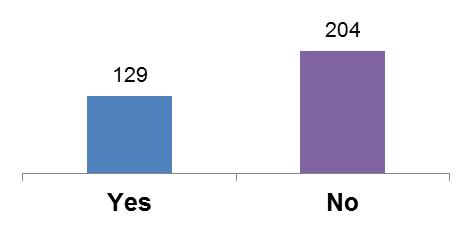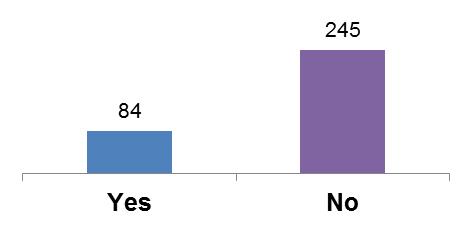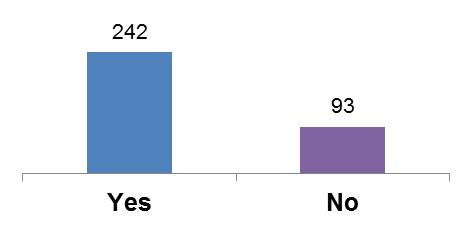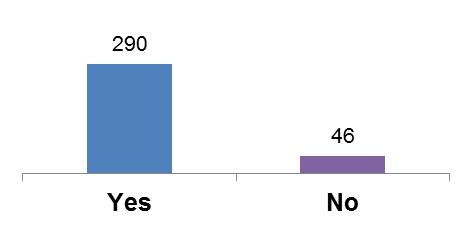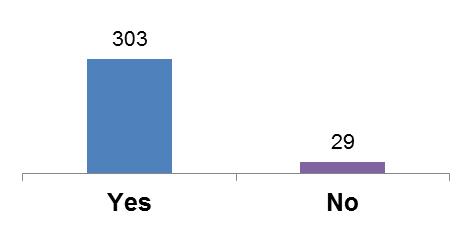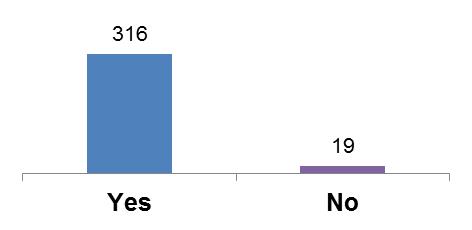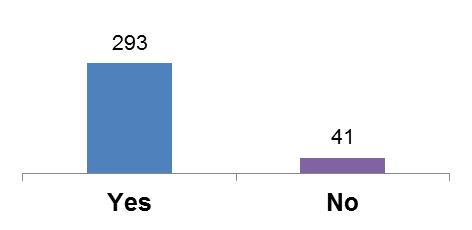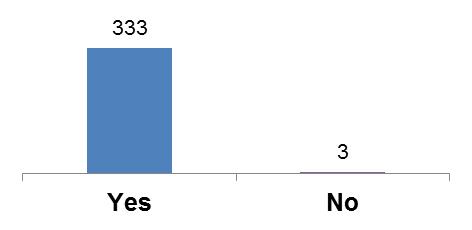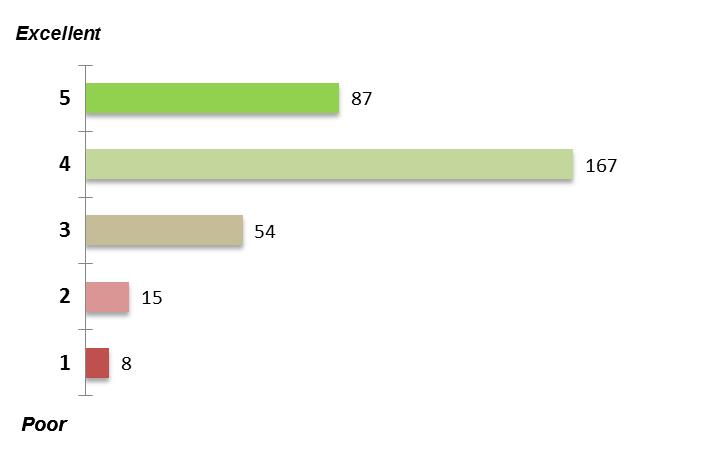Section 1: Conduct of the Electoral Event – Returning Officers' Report of Proceedings – 43rd General Election
336 ROs completed the Report of Proceedings, but not all results add up to 336 due to the optional nature of most questions. Two ROs did not complete the Report of Proceedings.
1.1. Training
Returning officer training
1. Did the training and information for ROs (e.g. pre-event assignments, online materials, regional meetings, etc.) satisfactorily prepare you for conducting the GE?
What went well
- 83% of ROs reported that their training satisfactorily prepared them for the GE.
- The online training modules helped ROs effectively deal with the challenges and were an excellent reference during the 43rd GE.
- Information given on processes and systems during regional meetings facilitated comprehension.
What could be improved
- EC Connex online training was very theoretical; simulated tasks would have helped increase experience and resolve kinks and inefficiencies in the system.
- The ability to have pre-event exposure and access to the various EC systems would build knowledge and confidence going into the GE.
- More informative and specific system user guides would be helpful, and would reduce calls for assistance to the Field Support Network (FSN).
- Training of the assistant returning officer (ARO) on the various EC systems, particularly the Field Assignments Management Tool (FAMT), RMS and ROPS would be beneficial.
- ROs would like to have access and exposure to ROPS and RMS well before the issue of the writ, for training purposes.
- While screenshots for training sessions in the Virtual Training Centre were appreciated, online videos showing the intended task from start to finish would reduce the follow up calls to FSN.
Other notable comments
- Event+ was an excellent tool that allowed ECHQ to effectively communicate with ROs.
- Informing new ROs of the challenges unique to their ED from previous GEs as part of their pre-event preparation would be beneficial.
Key staff training
2. Do you feel the training for the following key staff positions (financial officer [FO], automation coordinator [AC] and service point supervisor [SPS]) in the RO office satisfactorily prepared them for their duties?
Financial officer
What went well
- FOs with previous election experience benefited from the training.
What could be improved
- The instructions for the final pay period should be clearer; perhaps with illustrative examples.
- The online training for FOs was insufficient. FOs would benefit from receiving in-person training, like the SPSs and ACs.
- ROPS training before the GE was minimal and should have included a sandbox for practice.
Automation coordinator
What went well
- 90% of ROs were satisfied with the training for ACs.
What could be improved
- The training for experienced and inexperienced ACs should be separated. This would enable trainers to explain things in greater detail to the new ACs and avoid experienced ACs dominating discussions which impacted the new ACs' ability to take in key information.
Service point supervisor
What went well
- 74% of ROs were satisfied with the training for SPSs. The in-person format was well liked.
What could be improved
- More hands-on and less theoretical training, specifically on REVISE, targeted revision and data entry.
- The training for experienced and inexperienced SPSs should be separated. The inexperienced SPSs wanting to learn sometimes resulted in going over certain topics very thoroughly, which slowed down more experienced SPSs who wanted to increase their knowledge base.
- Training content regarding special ballot functions should be combined with revision.
- The content balance was not even between special ballot voting and revision. Special ballot voting took more of the training time; thus, some felt underprepared for revision.
Other notable comments
- The Service Agent Manual should include some information about voting in isolated areas, correctional facilities and hospitals. While this is included in the FAMT pre-event assignments mandate letter, service agents do not have access to it.
- The Service Point Supervisor Manual should include information about troubleshooting once a mistake has been made.
Poll worker training
3. Did the hands-on, in-class training program and tools (guidebooks, videos and teaching aids) for poll workers satisfactorily prepare them for their duties and enable them to exercise the correct procedures at the polls?
What went well
- The hands-on nature of the training programs.
- The colour coded guidebooks helped poll workers grasp information and understand the necessary processes and procedures.
What could be improved
- 61% of ROs reported that the training guidebooks, videos and teaching aids were insufficient in preparing poll workers for their duties at the polls
- The placemat (flowchart) for the return of ballot boxes and materials from the 42nd GE should be revived for the next GE.
- The complexity of the tasks for several positions (e.g. CPSs, poll workers, etc.) was the source of the problem; compounded by the fact that many ROs felt that the competency of the labour pool was low. Suggested solutions include longer training, or separating tasks into two streams: one group handling ordinary cases and another group handling more complex exceptions such as transfer certificates, registration forms, and correction certificates.
- There were inconsistencies between the various manuals and videos.
Other notable comments
- Some poll worker applicants attended paid training in multiple EDs, with no intention of working at all.
1.2. Recruitment of poll workers
Staffing levels
4. Were you able to recruit enough competent poll workers?
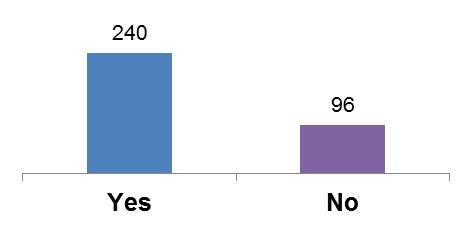
Text version of "Were you able to recruit enough competent poll workers?"
What went well
- 71% of ROs reported that they were able to recruit enough competent poll workers.
- Younger workers (high school students) were generally good workers. They were quicker learners and were less stubborn when presented with new processes, compared to older workers who often have entrenched beliefs about processes and procedures.
What could be improved
- ROs who hit recruitment targets highlighted the difficulty of hiring competent poll workers and the need to improve the quality of candidates.
- Coordinating between EC and the provincial election agencies in sharing lists of workers would be helpful.
- Current poll worker wages, considering the amount of hours worked, are often not competitive to other employers in the surrounding areas. Many ROs indicated that an increase in the hours and number of recruitment officers is required.
- Sharing applicant information between EDs that had sufficient and insufficient staffing at various points in the GE would help with staffing levels.
Other notable comments
- There was an imbalance between younger and older workers. ROs reaching out to school boards could increase the level of younger workers.
- The volume of names political parties give EC to consider for poll workers is in a downward trend, with the exception of some EDs in Quebec and the Atlantic provinces.
- The "no show" rate for poll workers during advance and ordinary polling days was a concern in some areas.
- Advance polls coinciding with a long weekend, together with longer polling hours and bilingual requirements resulted in more difficulty in getting a sufficient number of poll workers.
Recruitment tool effectiveness
5. Were the recruitment tools (RMS, posters, Poll Worker Recruitment Plan, online application form, media plan) effective for hiring poll workers and scheduling their training?
What went well
- The posters, poll worker recruitment plans and EC social media advertising strategy worked well.
- The repository of names on RMS was useful.
- A new RMS function which allowed applicants to channel their application to their ED by providing their postal code was well appreciated.
What could be improved
- 74% of ROs reported that the recruitment tools could be improved.
- ROs were disappointed that the RMS-ROPS integration did not work and overwhelmingly suggested this be a priority for the 44th GE.
- Introducing the following features would be useful to have in RMS:
- Indicating whether a potential poll worker has been contacted, hired, and trained.
- Creating an intuitive training calendar.
- Ability to filter duplicate applications.
- Having the ability to add potential poll worker applicants through sources other than the EC website.
- Better information on the hours and typical working conditions for poll workers on the EC website is needed, so they are well informed when they apply.
- The repository of names in RMS was not always accurate, and had many individuals who were deceased, had disconnected phone numbers, sought other employment or were no longer interested.
Hiring poll workers outside of the ED
6. Did you have to hire poll workers outside of your ED?
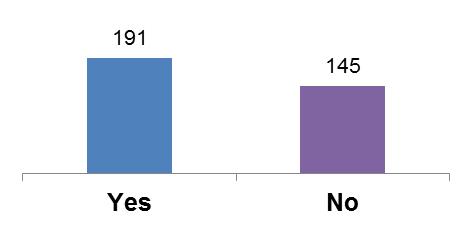
Text version of "Did you have to hire poll workers outside of your ED?"
What went well
- Some poll workers preferred working in adjacent EDs because of geographic proximity, or to work with friends, family or former colleagues.
What could be improved
- Some poll workers applied to multiple EDs, occasionally accepting positions in more than one ED and not making a final decision until shortly before working. This prevented ROs from entering the GE with solid staffing numbers.
1.3. Products, tools and resources
Material delivery satisfaction
7. Did you receive all the required materials (original shipments and subsequent orders) from EC within reasonable timeframes?
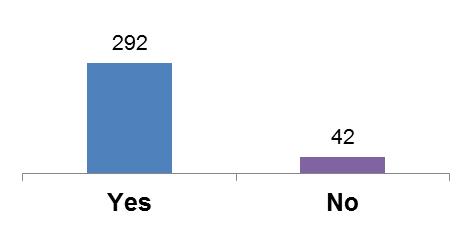
Text version of "Did you receive all the required materials from EC within reasonable timeframes?"
What went well
- 87% of ROs reported satisfaction with the timely delivery of materials.
- SMSi worked well; orders were shipped to the field quickly and contact was easy.
What could be improved
- Materials sent should always include an itemized list of contents and be organized in an orderly fashion.
- The Electoral Material Coordinator Manual should be available early, well before materials arrive, so the electoral material coordinator can read it ahead of time and know how to organize the materials.
- Certain supplies, such as the USB training key, Statement of the Vote envelopes, Braille List of Candidates, poll bags and ballot boxes need to be available earlier.
- Supplies for the ARO and additional assistant returning officer (AARO) offices should be sent directly. This would allow for quicker delivery.
ECDocs effectiveness
8. Did you find everything you needed to answer your questions and meet your information needs in the ECDocs section of the Field Personnel Intranet (e.g. manuals, forms, checklists, etc.)?
What went well
- 72% of ROs appreciated self-service through ECDocs and the quality of information on it.
What could be improved
- The ECDocs search function did not always work well; often the search field would yield too many results. An improvement of the search function is recommended.
- There should be a specific section on the Field Personnel Intranet for checklists, which are currently scattered in different parts of the Field Personnel Intranet.
Request for additional funds
9. Did you submit a request for additional funds for any section of your budget during the election calendar?
What went well
- ROs liked the flexibility to shift hours accordingly between positions.
- The approvals were prompt.
What could be improved
- 86% of ROs submitted requests for additional funds during the election calendar.
- It was hard to keep track of requests for additional funds via both EC Connex and Control of Authorization, and using both caused duplications.
- The budget should reflect the actual makeup of the ED, instead of a one size fits all model of budget allocation. This would help reduce the amount of requests for additional funds
- ROs would like to receive their budget early, so adjustments can be made before the writ is issued.
EC product/tool effectiveness
10. Did you experience any problems with functionality or processes related to any EC products or tools?
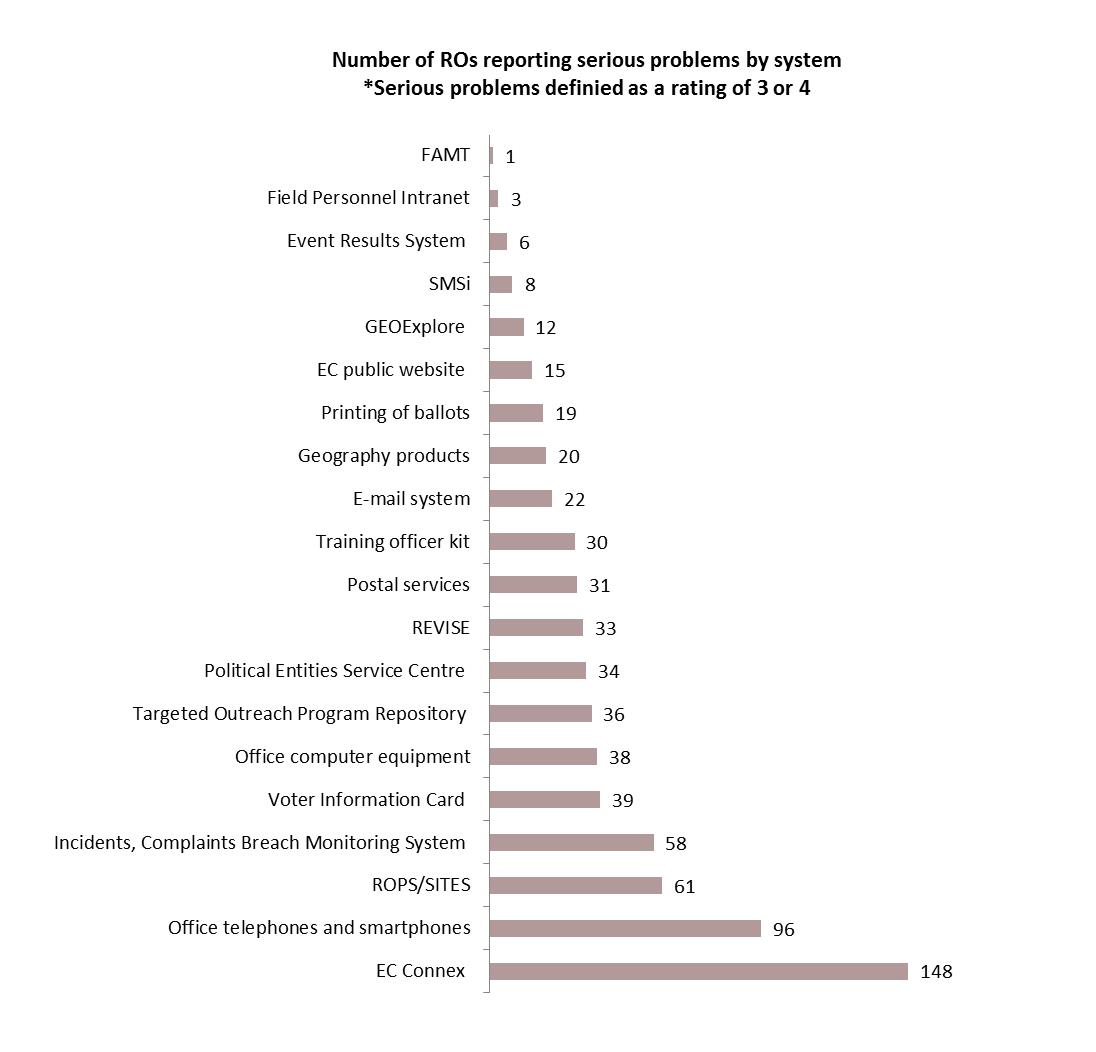
Text version of "Number of ROs reporting serious problems by system"
Comments
The comments regarding the various systems referenced here are discussed at length elsewhere throughout the document.
1.4. Services to political parties and candidates
Meetings with political entities
11. Did the meetings with political entities go well?
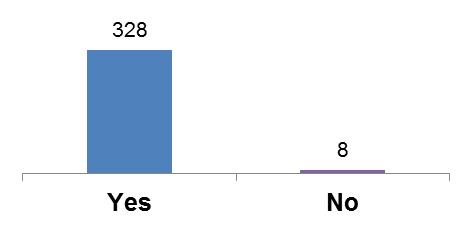
Text version of "Did the meetings with political entities go well?"
What went well
- 98% of ROs reported successful meetings with political entities.
- The meetings were informative and collaborative; interactions with candidates and their representatives were amicable and efficient.
What could be improved
- No trends observed.
Other notable comments
- 39 ROs reported poor attendance from candidates and their representatives.
- Over 90% of candidates filed their nominations by paper and not through the Political Entities Service Centre (PESC) portal. Despite ROs highlighting the PESC portal, candidates preferred to submit their nominations by paper and were unaware of the helpful documents on PESC. Some ROs suggested EC provide more information to potential/unofficial candidates on the nomination process and the legislative requirements and challenges of running in an election.
EC guidelines for meeting with political parties and candidates
12. Did the guidelines provided by EC assist you in conducting successful meetings with political parties and candidates?
What went well
- 94% of ROs found the guidelines provided by EC assisted in conducting meetings with political parties and candidates.
- The template letter and sample agenda for the meetings were greatly appreciated.
What could be improved
- No trends observed.
1.5. Revision
One-stop service model
13. Did the one-stop service model work well?
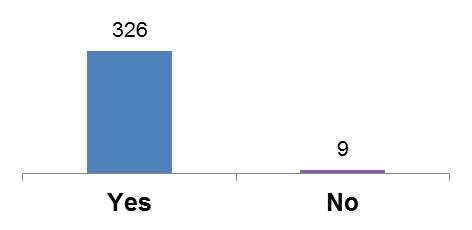
Text version of "Did the one-stop service model work well?"
What went well
- 97% of ROs reported that the one-stop service model worked well.
- The one-stop service model was greatly appreciated by electors and SPSs who agreed that the model is efficient and effective.
What could be improved
- Better information on special ballot voting opportunities and limitations for electors is required.
- Some service agents and SPSs were overwhelmed at the beginning of the GE by the volume of voters; this changed as more experience was gained.
Revision procedure effectiveness
14. Were there any issues or challenges with revision procedures (general guidelines, targeted revision, or revision at your office or at an AARO office)?
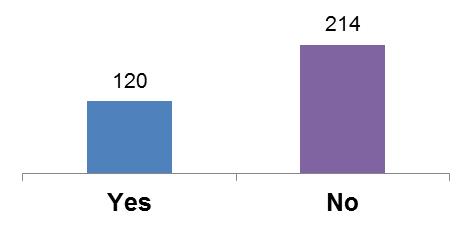
Text version of "Were there any issues or challenges with revision procedures?"
What went well
- 64% of ROs reported having no issues with revision.
- ROs appreciated electors being able to register online.
- ROs were happy with the instructions given concerning targeted revision and other revision procedures.
What could be improved
- 36% of ROs reported having issues with revision.
- The REVISE system was slow and timeouts frustrated ROs and other staff.
- Revision desks and door-to-door revision in high mobility or historically low voter turnout areas had poor yields.
- Insufficient amounts of targeted revision kits were received in some cases.
1.6. Outreach and accessibility
Accessibility issues
15. Were there accessibility issues that you could not resolve?
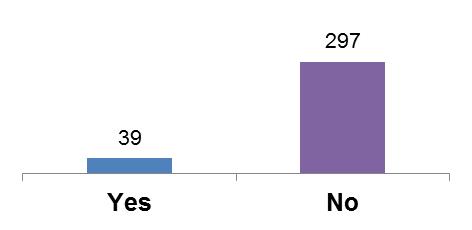
Text version of "Were there accessibility issues that you could not resolve?"
What went well
- 88% of ROs reported no accessibility issues that they could not resolve.
- Transfer certificates, special ballot voting and home visits helped solve wheelchair accessibility issues.
- With the preliminary visits to potential polling places, ROs had adequate time to confirm, troubleshoot and find alternative polling places.
What could be improved
- ROs suggested enhanced partnerships with provincial governments to use schools as polling places, given the accessibility standards of schools are relatively good.
- Clearer guidance for home visits would be helpful.
Other notable comments
- ROs in rural and semi-rural EDs reported a shortage of accessible buildings.
Resource allocation for community relation officers
16. Were resources (finances, material, time allocated) adequate for community relation officers (CROs) to do the needed work?
What went well
- 88% of ROs reported adequate resources for CROs to do the needed work.
- The materials sent were effective and helped CROs execute the required tasks.
What could be improved
- CROs would like more handout materials, EC swag and banners, and to receive it earlier, ideally before the writ is issued.
- Being able to hire and send CROs out to the field before the writ is issued would increase the effectiveness of outreach activities during the GE.
1.7. Official languages
Bilingual polling divisions
17. Did you have one or more polling division(s) (PDs) designated bilingual?
*232 EDs have one or more designated bilingual PD (i.e. PD with significant demand for services in either official language). This concept and its interpretation may still be confusing to ROs.
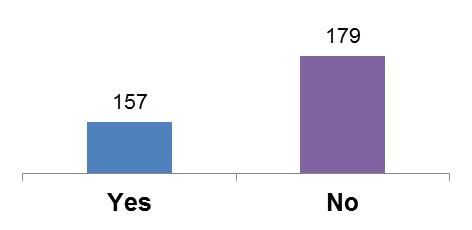
Text version of "Did you have one or more polling division(s) (PDs) designated bilingual?"
What went well
- Hiring bilingual poll workers from high schools worked well.
What could be improved
- No trends observed.
Allocation of bilingual poll workers
18. Did you assign a bilingual poll worker to each of those PDs?
*232 EDs have one or more designated bilingual PD (i.e. PD with significant demand for services in either official language). This concept and its interpretation may still be confusing to ROs.
Note: answers on the right side of the red line are solely from ROs with bilingual PDs.
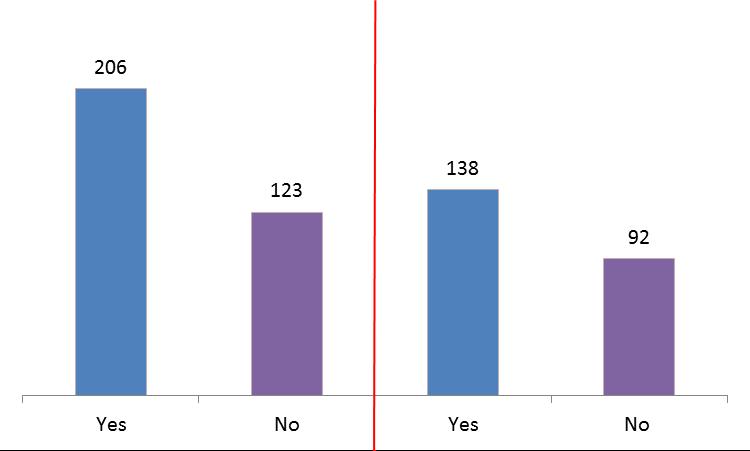
Text version of "Did you assign a bilingual poll worker to each of those PDs?"
What went well
- The ability to phone outside of the polling place to an individual who could serve the elector in English or French in the event that no bilingual poll workers were available proved to be useful.
What could be improved
- Finding French speaking poll workers continues to be a challenge in some EDs.
- The poll workers were not always able to effectively communicate in French.
Other notable comments
- Adding a bonus for bilingual poll workers should be considered.
1.8. Special Voting Rules
Special Voting Rules (SVR) process
19. Overall, did the SVR process go well?
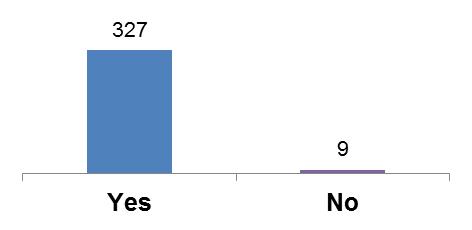
Text version of "Overall, did the SVR process go well?"
What went well
- 97% of ROs reported that the SVR process went well, particularly the one-stop service model.
What could be improved
- Public awareness around voting by special ballot could be improved.
- Some electors were unclear about the differences between the provincial and federal home visit criteria.
SVR identification rules
20. Were there any difficulties in administering SVR identification rules?
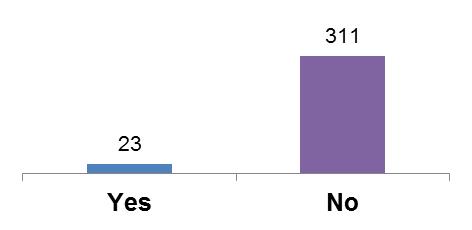
Text version of "Were there any difficulties in administering SVR identification rules?"
What went well
- 93% of ROs reported no difficulties in administering SVR identification rules.
- The explanation sheet was excellent.
- A large majority of electors complied and presented the correct documents for EC to administer SVR identification rules.
What could be improved
- Assisted living facilities were not always cooperative in administering SVR identification rules, as some staff members were stubborn in providing the residents' dates of birth.
- Special ballots returned through the mail posed some problems.
- Rural addresses and addresses with only PO Box numbers made it hard to match the elector identification with the elector registration.
Candidates' representatives observing SVR
21. Were there any issues with the presence of candidates' representatives observing SVR registration and voting?
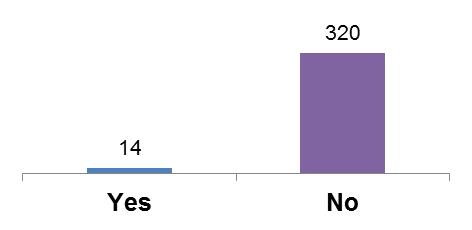
Text version of "Candidates' representatives observing SVR"
What went well
- 96% of ROs reported no issues with candidate's representatives observing the SVR process. The handful of individuals who did create issues ceased the behaviour after being informed of the rules and regulations.
What could be improved
- No trends observed.
Success of external service point (ESP) offices
22. Did voting at ESP offices in post-secondary institutions go well?
*ESPs were present in 86 EDs, but 90 ROs responded.
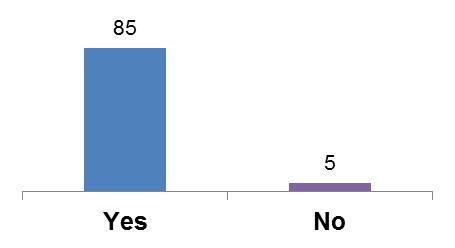
Text version of "Did voting at ESP offices in post-secondary institutions go well?"
What went well
- 94% of respondents reported that voting at ESP offices in post-secondary institutions went well.
- Students appreciated the convenience of being able to vote from school.
What could be improved
- No trends observed.
Other notable comments
- The service was not used by as many students as expected.
- Very few electors voted on Saturday and Sunday.
- The hours were too long, particularly the hours on Saturday and Sunday, and reducing them would not have denied many electors the right to vote
- Coordinating, installing and material pickup with IBM, ECHQ and Canada Post was frustrating for several ROs.
- Some ROs were frustrated with university administrators/student unions who did not share the same service-oriented vision in setting up and facilitating the vote. Some ROs were only allowed to set up ESPs in a zone with low foot traffic and limited advertising. It is suggested ECHQ work with university administrators/student unions to resolve these challenges.
- There was insufficient advertising for the ESPs.
1.9. Opening and closing of the polls
Timely opening and closing of the polls
23. Did anything prevent the timely and proper opening or closing of the polls?
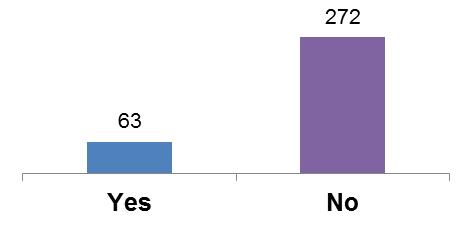
Text version of "Did anything prevent the timely and proper opening or closing of the polls?"
What went well
- 81% of ROs reported timely and proper opening and closing of the polls.
- Maintaining a significant numbers of stand-by workers and being able to switch polling staff between positions was helpful.
What could be improved
- No trends observed.
Other notable comments
- Some polls opened late due to workers being late, no-shows or dropouts shortly before polling day.
Voting at advance and ordinary polls
24. Overall, did voting at advance polls and ordinary polls go smoothly?
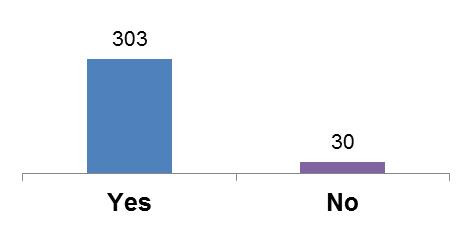
Text version of "Overall, did voting at advance polls and ordinary polls go smoothly?"
What went well
- 91% of ROs reported smooth voting at advance and ordinary polls.
What could be improved
- No trends observed.
Other notable comments
- Longer advance polling hours were cumbersome and exhausted many poll workers, leading to burnout and poorly executed tasks.
- Long lines at some polling places.
1.10. Returning officer's office closing activities
Compliance with the validation of results instructions
25. Was the validation of results completed as directed in the Returning Officer's Manual (Volume III, section 2.6)?
What went well
- 99% of ROs reported that the validation of the results was conducted correctly.
- The instructions were clear and effective.
What could be improved
- No trends observed.
Other notable comments
- Poor attendance from candidates and their representatives.
- The validation of results was complicated by the fact that many polling places did not return the electoral materials properly. As such, ROs had to open the ballot boxes or look in the transportation bag to retrieve the Statement of the Vote and other important electoral documents.
Procedural advice for RO office closing activities
26. What other procedures, if any, or modifications to current procedures would be useful to you in supporting the closing activities for your office or an AARO office, if applicable?
Comments
- The capture and upload of the Sequence Number Sheet data for political parties and candidates was challenging due to the shortness of time available for the task.
- There was frustration with sending a variety of materials back to ECHQ for shredding; it would be easier to shred the documents locally, which would reduce the amount of materials returned to ECHQ.
- The Return of Material Reference Table should be received at the beginning of the GE. This would have helped ROs have a better understanding of the contents of the return of materials by the end of the GE.
- The coordination of the return of materials and the decommissioning of the RO and AARO offices was frustrating, particularly the communication circuit between ECHQ, Bell Canada, IBM and Canada Post. Some ROs wanted direct contact with the various representatives, others were often required to quickly prepare supplies as short notice was given from one of the parties above.
1.11. Overall
27. Using the rating system below, please assess EC's level of service for this electoral event.
EC's communication with you during the pre-event period
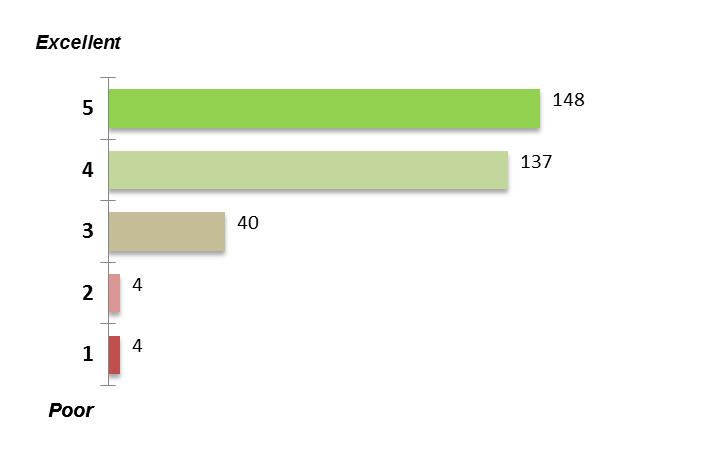
Text version of "EC's communication with you during the pre-event period"
What went well
- 86% of ROs reported satisfaction with ECs communication with them during the pre-event period.
- The weekly conference calls with FLOs were appreciated.
What could be improved
- Some communications were redundant.
EC's communication with you during the election period
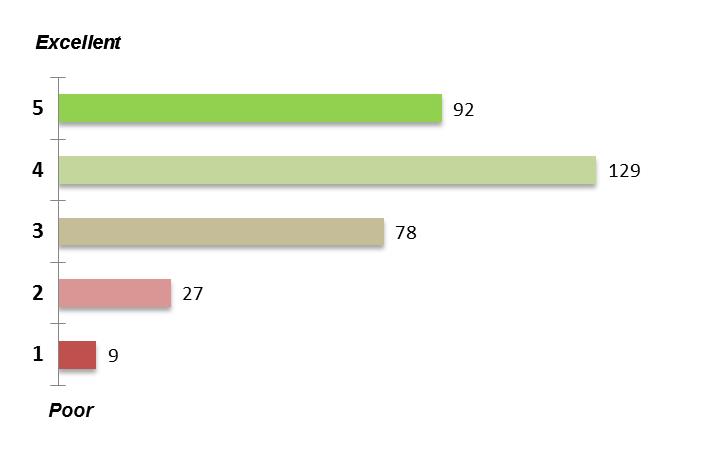
Text version of "EC's communication with you during the election period"
What went well
- 66% of ROs were satisfied with EC's communication with them during the GE.
- Event+ was an excellent tool that allowed ECHQ to effectively communicate with ROs.
What could be improved
- Some communications came too late, or at the last minute.
- There were last-minute updates and changes which resulted in contradictory information between communications, manuals, etc.
- Some communications were redundant.
Overall support from FSN
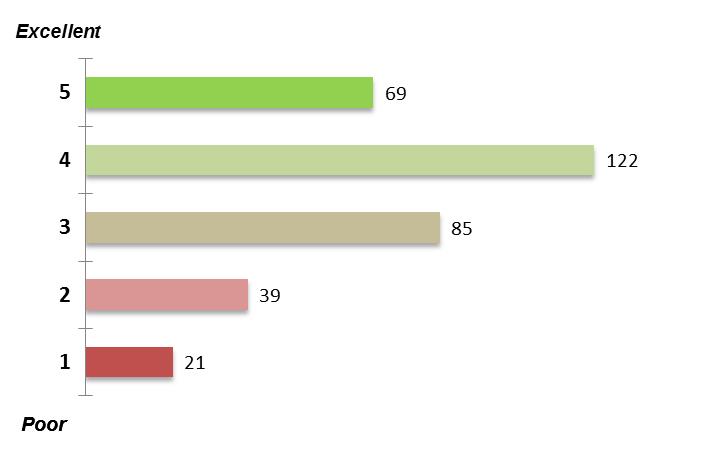
Text version of "Overall support from FSN"
What went well
- 57% of ROs were satisfied with overall support from FSN.
- FSN agents were kind and wanted to help.
What could be improved
- ROs were frustrated with the quality of responses from FSN. Some agents gave poor answers or were unable to understand the issue.
- There were delays in getting answers or solutions to problems via self-service through EC Connex or a call to the FSN helpline.
- There were long wait times to get through the FSN line.
- There were some issues with FSN agents' ability to effectively communicate in English and/or French.
Support on office or polling place leases
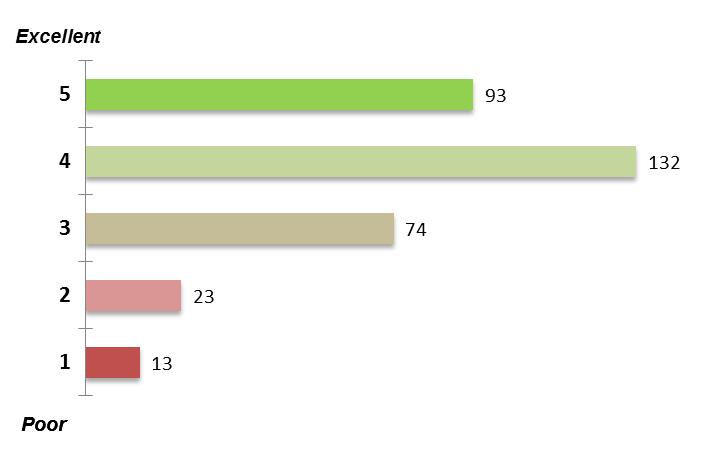
Text version of "Support on office or polling place leases"
What went well
- 68% of ROs reported satisfaction with the support they received on office and polling place leases.
- The empathy and efficiency of the team responsible for helping ROs sign RO office leases was appreciated.
What could be improved
- There was conflicting information on leases.
- There were delays in getting leases approved due to additional costs or other factors.
Support on computer and telecom issues
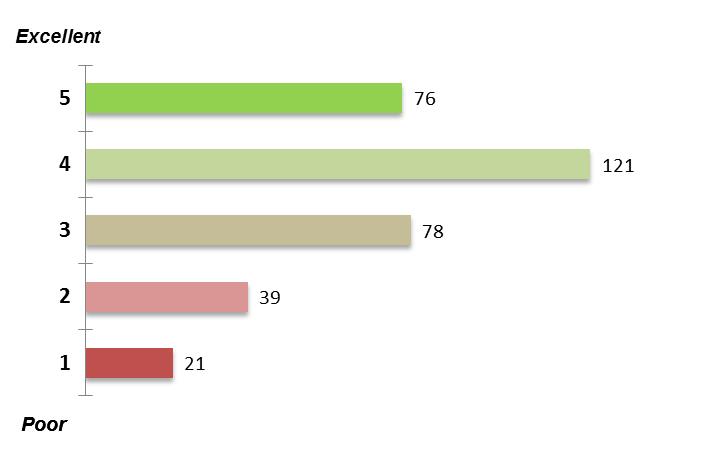
Text version of "Support on computer and telecom issues"
What went well
- 59% of ROs reported satisfaction with the support they received on computer and telecom issues.
What could be improved
- Responses were not always timely.
Other notable comments
- Often more than one visit was required to complete installation.
- There were problems with Blackberries, connectivity, and difficulties in using the devices.
Support on pay and financial issues
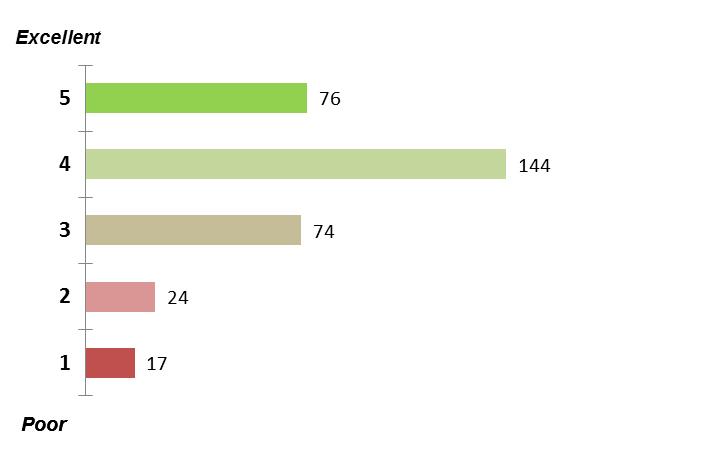
Text version of "Support on pay and financial issues"
What went well
- 66% of ROs reported satisfaction with the support they received on pay and financial issues.
What could be improved
- Some cases are still unresolved.
- The instructions on submitting timesheets through ROPS need to be clearer.
- The final pay period instructions need to be clearer.
Overall support from EC throughout the conduct of the electoral event
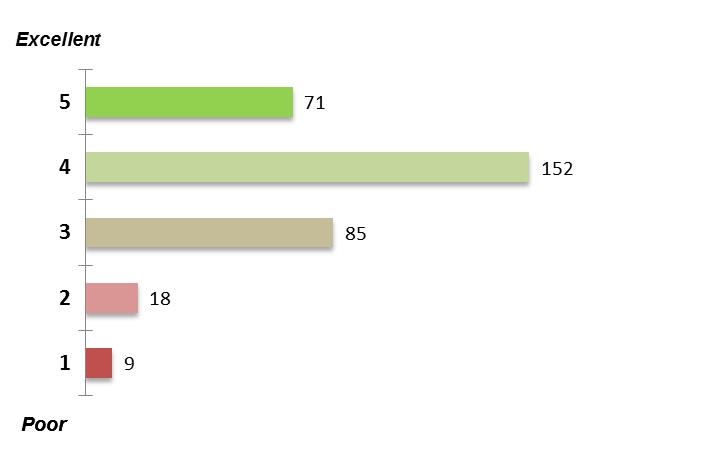
Text version of "Overall support from EC throughout the conduct of the electoral event"
What went well
- 66% of ROs reported satisfaction with EC support throughout the GE.
What could be improved
- No trends observed.
Overall level of readiness for the election based on completion of pre-event activities
What went well
- 77% of ROs reported feeling ready for the election based on the completion of pre-event activities.
- Some ROs cited an increased sense of confidence and readiness entering the GE, having completed the pre-event activities.
What could be improved
- There was a lack of exposure to certain systems going into the GE; ROs would have preferred having had access to each system (e.g. EC Connex, RMS, ROPS) before the GE.

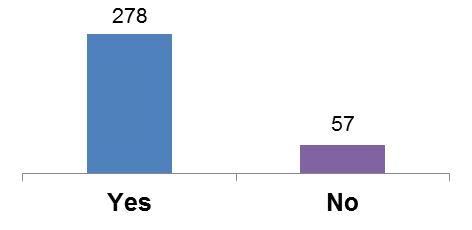
![Do you feel the training for the financial officer [FO] in the RO office satisfactorily prepared them for their duties?](/res/rec/eval/pes2019/rop/images/img2_e.jpg)
![Do you feel the training for the automation coordinator [AC] in the RO office satisfactorily prepared them for their duties?](/res/rec/eval/pes2019/rop/images/img3_e.jpg)
![Do you feel the training for the service point supervisor [SPS] in the RO office satisfactorily prepared them for their duties?](/res/rec/eval/pes2019/rop/images/img4_e.jpg)
